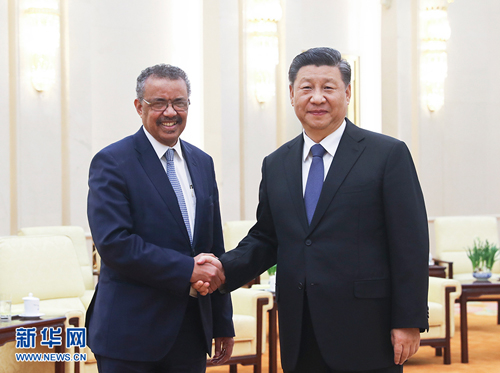NEW DELHI: As the world grapples with the coronavirus pandemic, troubling questions are being asked. Was there any way the infection could have been stopped from spreading? With prior information, could the number of those dead worldwide have been reduced?
Some of these questions centre on the role of the World Health Organisation (WHO) which, critics say, delayed the announcement of the pandemic for apparently “political” reasons (Director-General Tedros of Ethiopia is reportedly close to China). Only an objective inquiry can determine whether WHO was remiss in its duty. But some of the information publicly available, raises doubts and suspicions.
Take a look at this tweet by the WHO dated January 14, which said: “Preliminary investigations conducted by the Chinese authorities have found no evidence of human-to-human transmission of the novel coronavirus identified in Wuhan, China.”
But we learn from the Chinese media that President Xi Jinping held a meeting of the Politburo Standing Committee one week earlier, that is Jan. 7, and it is well known that this body (like India’s Cabinet Committee on Security) meets only when required, or during emergencies. The Communist Party journal Qiu Shi, carried a long commentary of what Xi Jinping said in its issue of Feb. 15. The details are revealing.
In the president’s own words, it documents meetings on the virus he chaired on Jan. 7, 20th, 22nd and in the first week of February. Xi is quoted as saying, “I made requests for the prevention and control of the novel coronavirus pneumonia … take measures to resolutely curb the spread of the epidemic … requested Hubei province to implement comprehensive and strict control over the outflow of personnel.”
The commentary underscored the urgency of the situation facing the country with Xi detailing the many meetings of the Communist Party Central Committee, the need to involve the army and the launch of a “people’s war” for epidemic prevention and control. He also said, “The situation is constantly changing and all work is facing new situations and problems,” underscoring the need to stabilize Hubei province and Wuhan in particular.
The question which arises here is whether the sense of urgency was communicated to the WHO? The WHO tweet does not reflect that, which suggests two disturbing options: Either China was economical with the truth while interacting with the WHO, or the WHO lied. The former seems more plausible while others say the role of WHO chief Dr. Tedros needs to be probed owing to China backing him for that job. This line of criticism accounts for the WHO’s big pat on the back for Beijing’s role in tackling the virus (which to be fair was effective domestically).
Was the WHO late in declaring the virus a pandemic on March 11, when it had already spread to 114 countries, had infected 114,000 people and resulted in more than 4,000 dead? In this context, Dr. Tedros’ statement can only be termed strange. He said, “We expect to see the number of cases, the number of deaths and the number of affected countries climb even higher.”
Considering that the WHO’s parent organization the United Nations, recognizes 195 countries as sovereign nation-states, that left only 81 countries untouched by the virus. With continents under lockdown, what prevented the WHO from declaring it a pandemic earlier? Was it Chinese pressure, one can only speculate. What could China have possibly gained from this? Possibly more time to bring the epidemic under control on its territory and distance itself from the overseas spread?
Note China’s response to the virus, which was slow. The first death from the coronavirus was recorded in Wuhan on Jan 11. The Wuhan Wholesale Seafood Market where the virus was traced, had been shut down on Jan. 1. A day earlier, health officials informed the WHO of the outbreak of a suspected “vertebrate to human” transmitted infectious disease. Given that the infection is reported to take 2-14 days to incubate, it means the outbreak could have begun sometime in the middle of December. Do also recall that earlier alerts sounded by Chinese doctors had been disregarded, and their voices were suppressed.
The first confirmed coronavirus case outside China was reported in Thailand on Jan 13, followed by Japan three days later. By Jan 17, nine countries including the US, South Korea, Nepal, France and so on were reporting cases. By Jan. 22, European airports were stepping up checks on flights from Wuhan and the very next day, that city was under lock down. Yet the WHO insisted on Jan. 23 that there was “no evidence” of the virus spreading between humans outside China.
The WHO declared it a “global emergency” on Jan. 30, when the number of cases in China jumped to over 7,000 and it was being reported from all of the 31 provinces. From that date until March 11, the WHO appeared to be watching the chaos unfold with yogic calm. So, when Prime Minister Modi called for reform and strengthening of the WHO at the G-20 video conference a few days ago, it could be seen as an indirect reference to the agency’s functioning at a time of unprecedented global crisis.
















